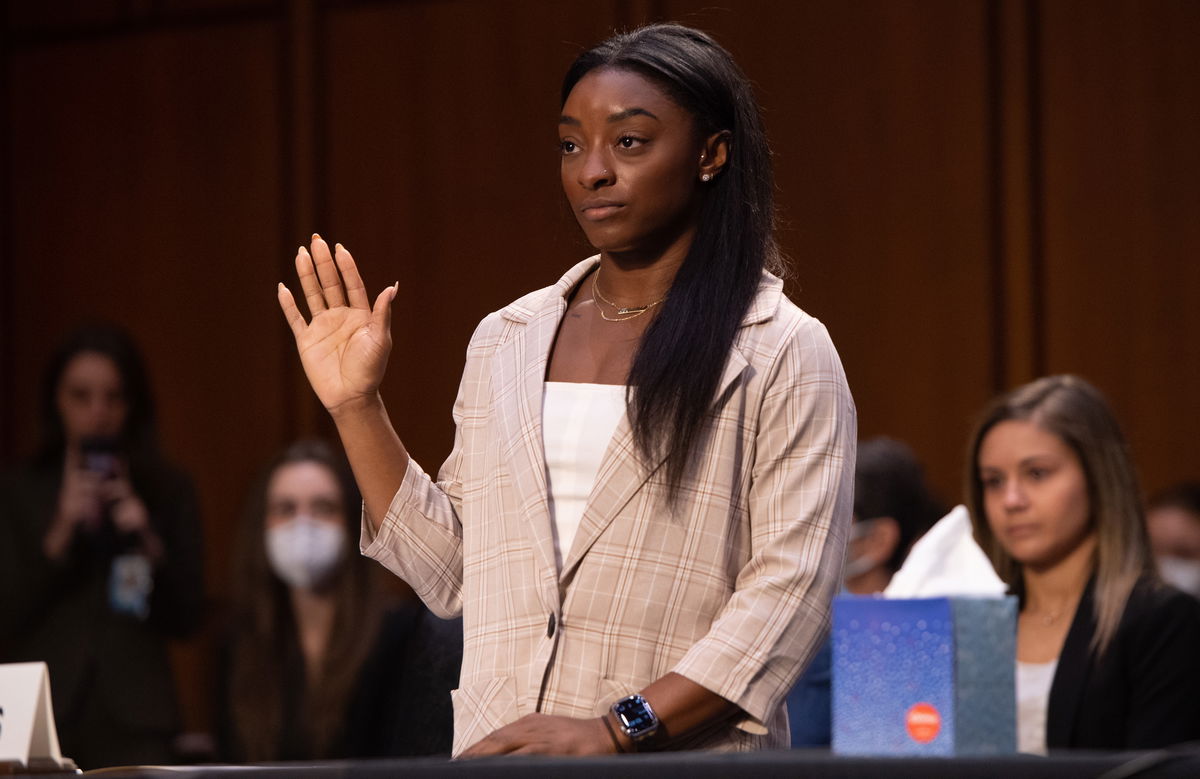
Getty
WASHINGTON, DC – SEPTEMBER 15: U.S. Olympic gymnast Simone Biles is sworn in to testify during a Senate Judiciary hearing about the Inspector General’s report on the FBI handling of the Larry Nassar investigation of sexual abuse of Olympic gymnasts, on Capitol Hill, September 15, 2021, in Washington, DC. (Photo by Saul Loeb – Pool/Getty Images)

Getty
WASHINGTON, DC – SEPTEMBER 15: U.S. Olympic gymnast Simone Biles is sworn in to testify during a Senate Judiciary hearing about the Inspector General’s report on the FBI handling of the Larry Nassar investigation of sexual abuse of Olympic gymnasts, on Capitol Hill, September 15, 2021, in Washington, DC. (Photo by Saul Loeb – Pool/Getty Images)
Are you aware of the largest s**ual abuse scandal in sports history? Well, the USA Gymnastics s*x abuse scandal was a shocking revelation of exploitation within gymnastics. More than 500 athletes were subjected to sexual assault by gym owners, coaches, and staff members across the country. At the center of this scandal was Larry Nassar, a national-team doctor for USAG, who used his position of trust to prey on young athletes such as Simone Biles, Gabby Douglas, and Jordyn Wieber, and more under the guise of medical treatment.
Watch What’s Trending Now!
Larry’s misdeeds were exposed after Simone Biles and others courageously came forward about the abuse. Biles specifically confidently declared, “Enough is enough.“ On April 23rd 2024, the Department of Justice made a noteworthy announcement outlining their intention to provide $139 million, in restitution, to victims of Larry Nassar’s misconduct.
Despite Nassar’s sentencing to life in prison, the haunting question lingers: What about the mental health of those who suffered this harassment? To this question, Kathy Johnson, a former elite gymnast turned sports commentator, recently sat down for an exclusive interview with EssentiallySports, shedding light on this critical topic.

In an exclusive interview with EssentiallySports, the interviewer asked Kathy a poignant question: “Mental health has become a major topic in sports today. You were, unfortunately, a victim of the coach’s verbal abuse, which led to your diagnosis of bulimia. Does it still affect you?“ Before revealing what she answered, let’s first know what Kathy has gone through, which led her to bulimia.
In the early stages of her career, Kathy Johnson’s coach was verbally abusive, pressuring her to lose weight and train even when she was seriously injured. Struggling to balance her university studies and maintain competitiveness in a sport that increasingly favored younger, lighter athletes, she developed bulimia, a disorder characterized by cycles of binge eating followed by purging or other behaviors to compensate for overeating. Now, coming back to what Kathy said about mental health and abuse.
Kathy replied, “Mental health is one of the most relevant topics to discuss in sports and in the sport of gymnastics so is human development. Gymnasts begin the sport as young children, sometimes as young as toddlers, and those who progress rapidly to an advanced or elite level are simultaneously going through stages of human development – toddler, early childhood, middle childhood, adolescence and adulthood. It’s vitally important they are surrounded by adults who understand this dynamic and feel the full weight of responsibility to ensure the physical, mental and emotional health of the child first, then the elite athlete.”

She further emphasized that, without awareness, there’s a risk of exploiting the power dynamic between coaches and athletes, leading to over-training, control, and abuse. This blurs the line between rigorous training and harmful behavior, ultimately damaging athletes’ mental health and well-being.
She added, “Instead of experiencing what responsible adult behavior looks, sounds, and feels like, it creates a massive gray area where predators can hide and operate in plain sight as Dr. Larry Nassar did.“ This highlights the critical need for clear boundaries and accountability within sports environments to ensure the safety and well-being of athletes. But did Kathy overcome this disorder?
How did Kathy Johnson overcome her eating disorder?
Kathy Johnson further explained her experience that, despite overcoming her eating disorder, the coaching and training methods prevalent in gymnastics for an extended period can inflict lasting trauma. She highlighted that such trauma may resurface as PTSD under certain circumstances.
She continued, “It’s why I and so many gymnasts, past and present, have spoken up to continue to grow awareness and inspire culture change.” This underscores the necessity for athletes to advocate for improved practices in the sport to prevent similar experiences for future generations. But how did he overcome the eating disorder?
With EssentiallySports, Kathy Johnson shared her journey of striving for the “perfect” body in her early days, resorting to extreme measures such as severe starvation and rigorous training to maintain a weight below 100 pounds. This pursuit led to delayed menstruation until the age of 25.
Reflecting on her struggles with weight gain later in life, Johnson confessed, “Then, when I got older and put on weight, I, all of a sudden, couldn’t do some of things I did before. I panicked. I thought, ‘I’m too heavy. If I were lighter, I would be a better gymnast.“ This highlights the challenges athletes face in meeting unrealistic standards and emphasizes the vital importance of self-acceptance and advocating for a supportive environment conducive to well-being.

